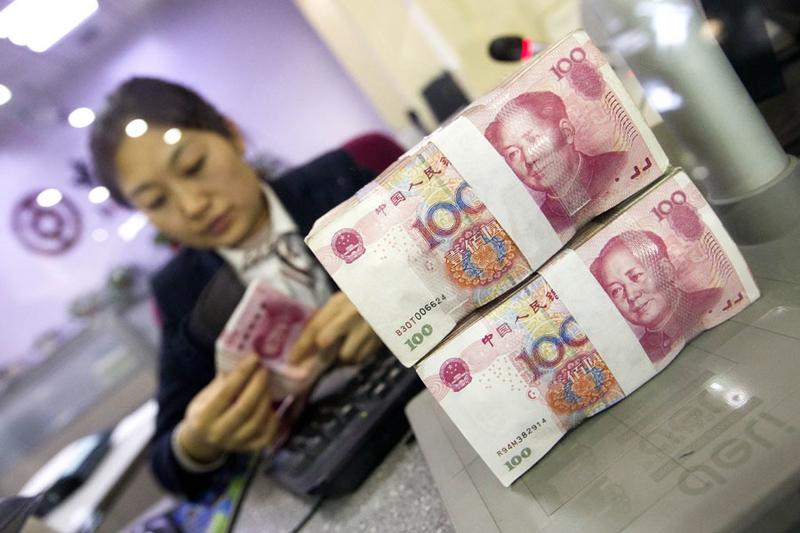Investors will look beyond Fed moves, eye China's financial opening-up
 A cashier at a bank in Taiyuan, Shanxi province counts renminbi notes. (PHOTO / CHINA NEWS SERVICE)
A cashier at a bank in Taiyuan, Shanxi province counts renminbi notes. (PHOTO / CHINA NEWS SERVICE)
China's yuan-denominated assets will remain attractive for global investors as the domestic financial sector will further open up and authorities strive to stabilize monetary policy, prevent systemic risks and neutralize any potential effects of possible policy tightening by the US central bank, analysts said on Thursday.
Chinese policymakers said on Wednesday they will strengthen policy efforts to stabilize market expectations and maintain steady economic growth. Global investors foresee an earlier-than-expected rate hike by the US Federal Reserve in 2022, which could possibly roil the world's financial markets.
At a virtual news conference on Wednesday afternoon, US Fed Chair Jerome Powell said no decisions were made on a specific time to start reducing asset purchases, a process referred to as "tapering".
The effects of tapering could be neutral for the capital market
Cheng Shi, chief economist at ICBC International
But Powell said participants of the Fed's September policy meeting generally viewed that "so long as the recovery remains on track, a gradual tapering process that concludes around the middle of next year is likely to be appropriate".
Meanwhile, more Fed officials predicted an interest rate hike next year, according to projections released after the meeting.
Some predicted the tapering process may begin as early as in December. But, as the market has already received the tightening signal, the shock would be not as much as in 2013 when the Fed withdrew the aggressive stimulus launched in response to the 2008-09 Global Financial Crisis, said Cui Rong, a senior analyst with CITIC Securities.
"The effects of tapering could be neutral for the capital market," said Cheng Shi, chief economist at ICBC International. "Any delay in tapering may pose greater risks to the market, which will boost US inflation expectations and exacerbate the bubble risk in the commodity and real estate markets."
Any Fed move to reduce asset purchases may have effects on global investors' demand for Chinese government bonds, because the China-US treasury yield gap could narrow, especially after any US rate hike next year, said Stephen Chiu, Asia forex and rates strategist of Bloomberg Intelligence.
In recent months, financial authorities in China sent strong signals of further opening-up and reiterated they will maintain financial stability. One of their latest measures was the issuance of 8 billion yuan ($1.24 billion) RMB-denominated sovereign bonds by the Ministry of Finance in Hong Kong's offshore market on Thursday.
"The issuance is at a time when China's economy continues growing resiliently, overcoming the impact of COVID-19, while the monetary policy remains stable, making RMB-denominated assets attractive to global investors," said Mark Wang, president and chief executive officer of HSBC China.
"We actually have been seeing strong demand for RMB bonds from global investors since the beginning of the year," said Wang. "Chinese bond issuers with high credit rating received robust subscription requests from a wide overseas investor community and typically with attractive bids, while global investors remain particularly keen on RMB bonds that the Ministry of Finance plans to bring to the offshore markets."
On Wednesday, an executive meeting of the State Council, China's Cabinet, urged to maintain the continuity and stability of macroeconomic policies, and policy measures should be preemptive and coordinated across economic cycles.
Efforts are needed to better coordinate fiscal, financial and employment policies in order to stabilize expectations of the market and keep them reasonable, said the meeting statement.
China's monetary policy focuses on goals of currency stability, full employment, financial stability and achieving equilibrium of balance of payments, especially paying great attention to supporting small-scale businesses and vulnerable sectors, said Ming Ming, chief analyst of fixed-asset investment of CITIC Securities.
Monetary measures will be optimized to serve the real economy as well as to stabilize job and financial markets, while the exchange rate of the renminbi is predicted to remain stable, with moderate ups and downs against the US dollar, said Ming.


